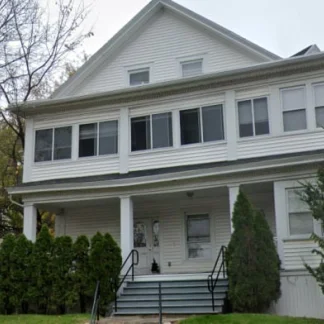Clearview Counseling Group
Clearview Counseling Group is a private rehab located in Longmeadow, Massachuset...
Behavioral Health Network - My Sister's House is a structured recovery home for women, 18 years and older, including pregnant and post-partum women and their infants. Behavioral Health Network - My Sister's House offers a 24-hour long term residential program that includes counseling and case management services. My Sister's House is located at Springfield, Massachusetts.
Contact us for more information: (413) 733-7891

Connect with BHN My Sister's House by calling their admissions team directly.
(413) 733-7891 Website Get DirectionsThe Commission on Accreditation of Rehabilitation Facilities (CARF) is a non-profit organization that specifically accredits rehab organizations. Founded in 1966, CARF's, mission is to help service providers like rehab facilities maintain high standards of care.
CARF Accreditation: Yes
Group therapy is any therapeutic work that happens in a group (not one-on-one). There are a number of different group therapy modalities, including support groups, experiential therapy, psycho-education, and more. Group therapy involves treatment as well as processing interaction between group members.
In individual therapy, a patient meets one-on-one with a trained psychologist or counselor. Therapy is a pivotal part of effective substance abuse treatment, as it often covers root causes of addiction, including challenges faced by the patient in their social, family, and work/school life.
Life skills trainings involve all the skills a person must have in order to function successfully in the world. These include time management, career guidance, money management, and effective communication. Truly successful addiction recovery is based on the ability to not only live substance-free, but to thrive. Life skills teaches the practical necessities of functioning in society, which sets clients up for success in life, and therefore sobriety.
In individual therapy, a patient meets one-on-one with a trained psychologist or counselor. Therapy is a pivotal part of effective substance abuse treatment, as it often covers root causes of addiction, including challenges faced by the patient in their social, family, and work/school life.
Life skills trainings involve all the skills a person must have in order to function successfully in the world. These include time management, career guidance, money management, and effective communication. Truly successful addiction recovery is based on the ability to not only live substance-free, but to thrive. Life skills teaches the practical necessities of functioning in society, which sets clients up for success in life, and therefore sobriety.
Life skills trainings involve all the skills a person must have in order to function successfully in the world. These include time management, career guidance, money management, and effective communication. Truly successful addiction recovery is based on the ability to not only live substance-free, but to thrive. Life skills teaches the practical necessities of functioning in society, which sets clients up for success in life, and therefore sobriety.
Clearview Counseling Group is a private rehab located in Longmeadow, Massachuset...
Behavioral Health Network – The Village for Youth is a non-profit rehab located ...
Springfield Comprehensive Treatment Center is a private rehab located in Springf...
Hogarcrea International is a private rehab located in Springfield, Massachusetts...